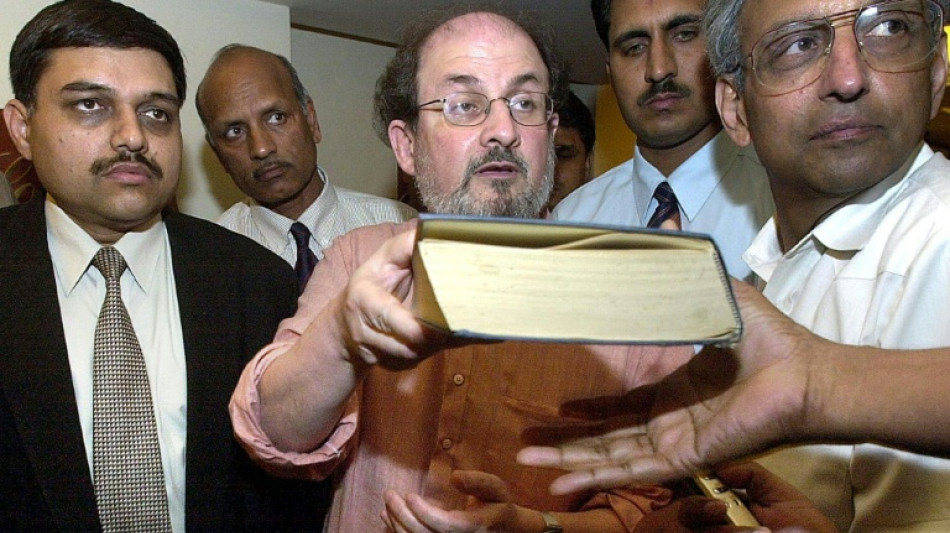
-
 Captain's injury agony mars 'emotional' Italy debut at T20 World Cup
Captain's injury agony mars 'emotional' Italy debut at T20 World Cup
-
Family matters: Thaksin's party down, maybe not out

-
 African players in Europe: Ouattara fires another winner for Bees
African players in Europe: Ouattara fires another winner for Bees
-
Pressure grows on UK's Starmer over Epstein fallout
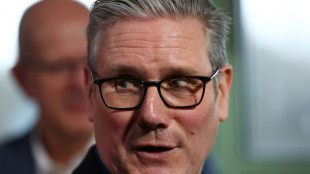
-
 Music world mourns Ghana's Ebo Taylor, founding father of highlife
Music world mourns Ghana's Ebo Taylor, founding father of highlife
-
HK mogul's ex-workers 'broke down in tears' as they watched sentencing

-
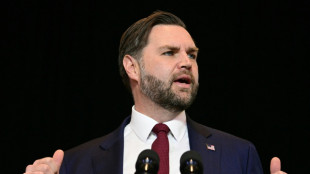 JD Vance set for Armenia, Azerbaijan trip
JD Vance set for Armenia, Azerbaijan trip
-
Sydney police deploy pepper spray as Israeli president's visit sparks protests
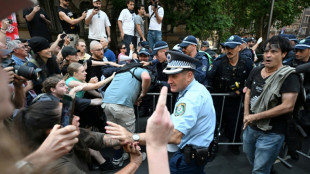
-
 EU warns Meta it must open up WhatsApp to rival AI chatbots
EU warns Meta it must open up WhatsApp to rival AI chatbots
-
Scotland spoil Italy's T20 World Cup debut with big win

-
 Israeli president says 'we will overcome evil' at Bondi Beach
Israeli president says 'we will overcome evil' at Bondi Beach
-
Munsey leads Scotland to 207-4 against Italy at T20 World Cup

-
 Japan restarts world's biggest nuclear plant again
Japan restarts world's biggest nuclear plant again
-
Bangladesh poll rivals rally on final day of campaign

-
 Third impeachment case filed against Philippine VP Duterte
Third impeachment case filed against Philippine VP Duterte
-
Wallaby winger Nawaqanitawase heads to Japan

-
 Thailand's Anutin rides wave of nationalism to election victory
Thailand's Anutin rides wave of nationalism to election victory
-
Venezuela's Machado says ally kidnapped by armed men after his release

-
 Maye longs for do-over as record Super Bowl bid ends in misery
Maye longs for do-over as record Super Bowl bid ends in misery
-
Seahawks' Walker rushes to Super Bowl MVP honors

-
 Darnold basks in 'special journey' to Super Bowl glory
Darnold basks in 'special journey' to Super Bowl glory
-
Japan's Takaichi may struggle to soothe voters and markets

-
 Seahawks soar to Super Bowl win over Patriots
Seahawks soar to Super Bowl win over Patriots
-
'Want to go home': Indonesian crew abandoned off Africa demand wages

-
 Asian stocks track Wall St rally as Tokyo hits record on Takaichi win
Asian stocks track Wall St rally as Tokyo hits record on Takaichi win
-
Bad Bunny celebrates Puerto Rico in joyous Super Bowl halftime show

-
 Three prominent opposition figures released in Venezuela
Three prominent opposition figures released in Venezuela
-
Israeli president says 'we shall overcome this evil' at Bondi Beach

-
 'Flood' of disinformation ahead of Bangladesh election
'Flood' of disinformation ahead of Bangladesh election
-
Arguments to begin in key US social media addiction trial

-
 Who is the Best Facelift Surgeon in Florida?
Who is the Best Facelift Surgeon in Florida?
-
FireFox Gold Expands the Northeast Zone, including 54.91 g/t Gold over 1.95 Metres in 95 Metre Step-out at Mustajärvi Gold Project, Finland

-
 Dr. Jonathan Spages Expands Diabetes Reversal Practice Across New States, Adds Clinical Team to Meet Growing Demand
Dr. Jonathan Spages Expands Diabetes Reversal Practice Across New States, Adds Clinical Team to Meet Growing Demand
-
Agronomics Limited Announces Net Asset Value Calculation as at 31 December 2025
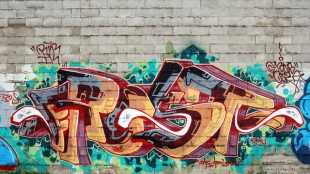
-
 UK-Based Vesalic Limited Emerges from Stealth with Landmark Discovery of Potential Non-CNS Driver of Motor Neuron Diseases, including ALS, and Breakthrough Therapeutic and Diagnostic Opportunities
UK-Based Vesalic Limited Emerges from Stealth with Landmark Discovery of Potential Non-CNS Driver of Motor Neuron Diseases, including ALS, and Breakthrough Therapeutic and Diagnostic Opportunities
-
Gotterup tops Matsuyama in playoff to win Phoenix Open

-
 New Zealand's Christchurch mosque killer appeals conviction
New Zealand's Christchurch mosque killer appeals conviction
-
Leonard's 41 leads Clippers over T-Wolves, Knicks cruise

-
 Trump says China's Xi to visit US 'toward the end of the year'
Trump says China's Xi to visit US 'toward the end of the year'
-
Real Madrid edge Valencia to stay on Barca's tail, Atletico slump

-
 Malinin keeps USA golden in Olympic figure skating team event
Malinin keeps USA golden in Olympic figure skating team event
-
Lebanon building collapse toll rises to 9: civil defence

-
 Real Madrid keep pressure on Barca with tight win at Valencia
Real Madrid keep pressure on Barca with tight win at Valencia
-
PSG trounce Marseille to move back top of Ligue 1

-
 Hong Kong to sentence media mogul Jimmy Lai in national security trial
Hong Kong to sentence media mogul Jimmy Lai in national security trial
-
Lillard will try to match record with third NBA 3-Point title

-
 Vonn breaks leg as crashes out in brutal end to Olympic dream
Vonn breaks leg as crashes out in brutal end to Olympic dream
-
Malinin enters the fray as Japan lead USA in Olympics team skating

-
 Thailand's Anutin readies for coalition talks after election win
Thailand's Anutin readies for coalition talks after election win
-
Fans arrive for Patriots-Seahawks Super Bowl as politics swirl


February 14, 1989: The fatwa against Salman Rushdie
Friday's knife attack on Salman Rushdie comes more than 33 years after the fatwa against him by Iran's supreme leader Ayatollah Ruhollah Khomeini, in which he sentenced him to death.
- The Fatwa -
On February 14, 1989 Khomeini called for him to be killed for writing "The Satanic Verses", which the cleric said insulted Islam.
In a fatwa, or religious decree, Khomeini urged "Muslims of the world rapidly to execute the author and the publishers of the book" so that "no one will any longer dare to offend the sacred values of Islam."
Khomeini, who was 89 and had just four months to live, added that anyone who was killed trying to carry out the death sentence should be considered a "martyr" who would go to paradise.
A $2.8-million bounty was put on the writer's head.
The British government immediately granted police protection to Rushdie, an atheist born in India to non-practising Muslims.
For almost 13 years he moved between safe houses under the pseudonym of Joseph Anton, changing base 56 times in the first six months. His solitude was worsened by the split with his wife American novelist Marianne Wiggins, to whom "The Satanic Verses" are dedicated.
"I am gagged and imprisoned," he recalled writing in his diary in his 2012 memoir, "Joseph Anton".
"I can't even speak. I want to kick a football in a park with my son. Ordinary, banal life: my impossible dream."
- 'Blasphemous' -
Viking Penguin published "The Satanic Verses" in September 1988 to critical acclaim.
The book is set by turns in the London of Conservative British prime minister Margaret Thatcher and ancient Mecca, Islam's holiest site.
It centres on the adventures of two Indian actors, Gibreel and Saladin, whose hijacked plane explodes over the English Channel.
They re-emerge on an English beach and mix with immigrants in London, the story unfolding in surreal sequences reflecting Rushdie's magic realism style.
The book was deemed blasphemous and sacrilegious by many Muslims including over references to verses alleged by some scholars to have been an early version of the Koran and later removed.
These verses allow for prayers to be made to three pagan goddesses, contrary to Islam's strict belief that there is only one God.
Controversially, Rushdie writes of the involvement of a prophet resembling the founder of Islam, Mohammed.
This prophet is tricked into striking a deal with Satan in which he exchanges some of his monotheistic dogmatism in favour of the three goddesses. He then realises his error.
Khomeini and others insist he had depicted the prophet irreverently.
- 'Hang Rushdie' -
In October 1988, Indian Prime Minister Rajiv Gandhi banned the import of the book, hoping to win Muslim support ahead of elections. Some 20 countries went on to outlaw it.
In January 1989, Muslims in Britain's northern city of Bradford burned copies in public.
A month later, thousands of Pakistanis attacked the US Information Center in Islamabad, shouting "American dogs" and "hang Salman Rushdie". Police opened fire, killing five.
Khomeini's fatwa provoked horror around the Western world.
There were protests in Europe, and London and Tehran broke off diplomatic relations for nearly two years.
In the United States, authors like Susan Sontag and Tom Wolfe organised public lectures to support Rushdie.
The author tried to explain himself in 1990 in an essay titled "In Good Faith" but many Muslims were not placated.
- Attacks -
Rushdie gradually emerged from his underground life in 1991, but his Japanese translator was killed in July that year.
His Italian translator was stabbed a few days later and a Norwegian publisher shot two years later, although it was never clear the attacks were in response to Khomeini's call.
In 1993, Islamist protesters torched a hotel in Sivas in central Turkey, some of whom were angered by the presence of writer Aziz Nesin, who sought to translate the novel into Turkish. He escaped but 37 people were killed.
In 1998, the government of Iran's reformist president Mohammad Khatami assured Britain that Iran would not implement the fatwa.
But Khomeini's successor, Ayatollah Ali Khamenei, said in 2005 he still believed Rushdie was an apostate whose killing would be authorised by Islam.
- 'Islamophobia' -
Many Muslims were furious when Rushdie was knighted by Queen Elizabeth II in 2007 for his services to literature.
Iran accused Britain of "Islamophobia", saying its fatwa still stood, and there were widespread Muslim protests, notably in Pakistan.
Rushdie was by then living relatively openly in New York where he moved in the late 1990s, and where his recent novels are set.
After many years living in the shadows, he became something of a socialite and is seen by many in the West as a free speech hero.
Until Friday's knife attack, he had very much resumed a normal life.
L.Durand--AMWN
